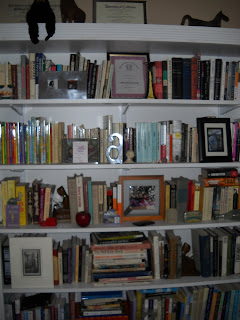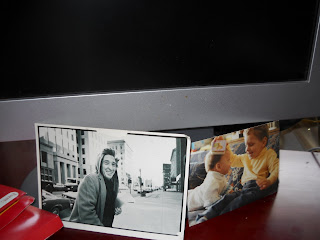This week, I watched two new TV shows, “The Marriage Ref” and “The Ricky Gervais Show.” In the first, three celebrities (who have thus far included Jerry Seinfeld [the show’s creator], Alec Baldwin, Larry David, Madonna, Tina Fey, and others) discuss ordinary couples’ marriage problems; in the second, animated versions of Gervais and two of his collaborators sit around a table and discuss whatever pops into their oversized cartoon heads. Both shows feature discussion among bright, engaging, funny people (Madonna being the exception, but I digress).
I think we’re hungry for good conversation. For too many years, we’ve been watching the Kardashian sisters spew drivel and “real” housewives gossip and whine like nine-year-olds. Late-night talk shows used to provide a forum for intelligent, witty banter, but now, often, the guests are there simply to hawk a movie they’ve made. Their ulterior motives show; they aren’t up for an interaction that is both revealing and entertaining. If they are under twenty-five, they aren’t capable of it.
People don’t know how to talk well these days. I don’t mean “speak well,” i.e., use proper grammar and words appropriate to context. I mean they don’t know how to engage in discourse. There is an art to conversation, to sustaining a rhythm that includes equal measures of self-revelation, interest in the topic at hand, and genuine concern for what other participants have to say. I worry that it is dying, that the only people left talking on television will be bickering reality-show contestants and tongue-tied celebrity nitwits.
I may have to watch sports (with the sound off).
**
On the book front: During the holidays, I received from Bryn Mawr classmate and friend Maureen ’78 A VERY PRIVATE EYE, a memoir (told in journal entries and letters) by British author Barbara Pym. Wonderful! Descriptions of 1930s Oxford, trips to pre-War Germany, conversations with literate friends (see above). I enjoyed the memoir so much that I went out and bought one of Pym’s novels, A GLASS OF BLESSINGS. (All of Pym’s books have marvelous titles.) Also wonderful. Pym is often described as a sort of mid-20th-century Jane Austen, a term not to be bandied about. It’s accurate, I think.

One of the signal events of Pym’s life as a writer was her publisher’s decision in the early ‘60s to stop publishing her. Despite having a loyal and small-but-significant fan base, she was deemed too old-fashioned and not enough of a money-maker. She took the blow in her usual stride, saying all sorts of stoic and very British things, but I know she must have been heartbroken. Her rejection at the hands of money-hungry publishers is emblematic of the contempt in which artists are held and with which many writers I know are sadly familiar.
Rejection notwithstanding, she kept writing and enjoyed a measure of success and redemption before her death in 1980. Now she is my hero. She reminds me not to give up and to take setbacks with grace. (I may not be very good at this last one.)
Sometimes I wish I had Kim Kardashian’s ass (which really is spectacular). But I’d settle happily for Barbara Pym’s stiff upper lip.
















